Key takeaways:
- Wildlife conservation is integral to maintaining ecological balance, highlighting the role of every species and the necessity for sustainable practices.
- Policy negotiations unite diverse stakeholders and foster understanding, balancing economic interests with conservation goals.
- Building trust and maintaining open communication are essential for successful negotiations, ensuring all stakeholders feel heard and valued.
- Lessons from past negotiations emphasize the importance of realistic timelines, addressing power dynamics, and incorporating monitoring for effective policy-making.
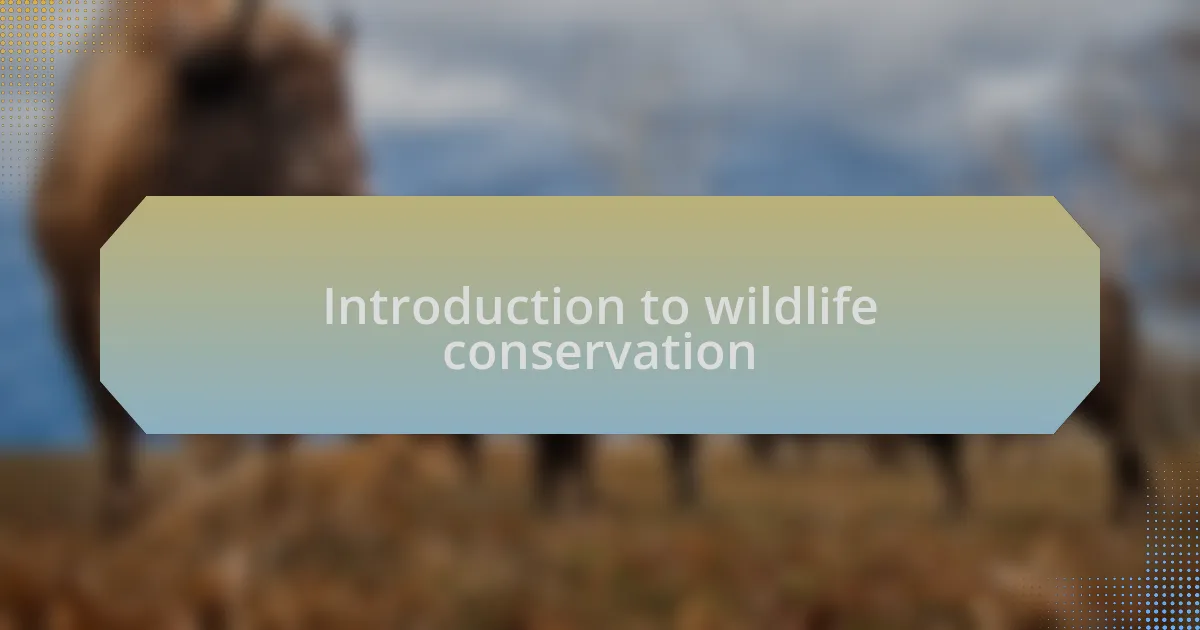
Introduction to wildlife conservation
Wildlife conservation is a critical field that focuses on protecting the diverse array of species and ecosystems that inhabit our planet. I’ve often found myself captivated by the intricate connections between species; for instance, have you ever paused to consider how a single bee can impact the entire food chain? This realization sparked my passion for conservation and highlighted how every creature, no matter how small, plays a vital role in maintaining ecological balance.
As I’ve delved deeper into the world of conservation, I’ve encountered heartbreaking stories that remind me of the stakes involved—like the near extinction of the Amur leopard, driven by habitat loss and poaching. These narratives fuel my determination to advocate for sustainable practices. Aren’t we, as stewards of the earth, responsible for ensuring that future generations have the chance to witness the wonders of wildlife?
The importance of engaging with communities and policymakers in conservation efforts cannot be underestimated. Reflecting on my experiences in collaborative projects, I recognize that grassroots involvement leads to more effective outcomes. Wouldn’t it be incredible if every individual felt empowered to contribute to wildlife conservation, recognizing that their efforts, no matter how small, could make a significant difference?
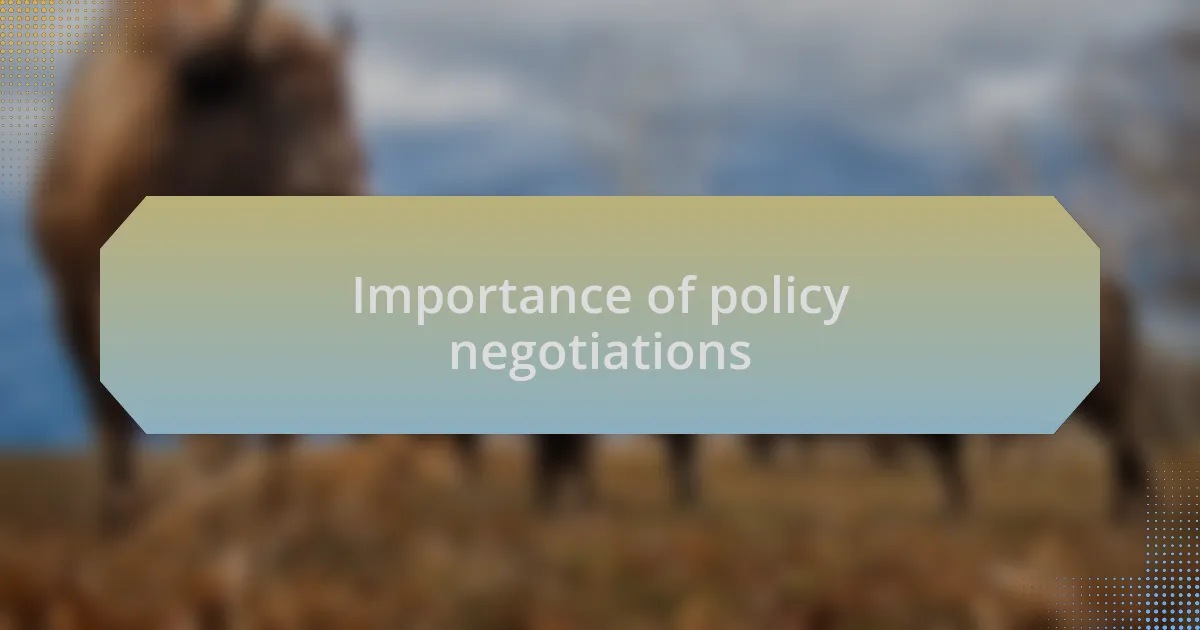
Importance of policy negotiations
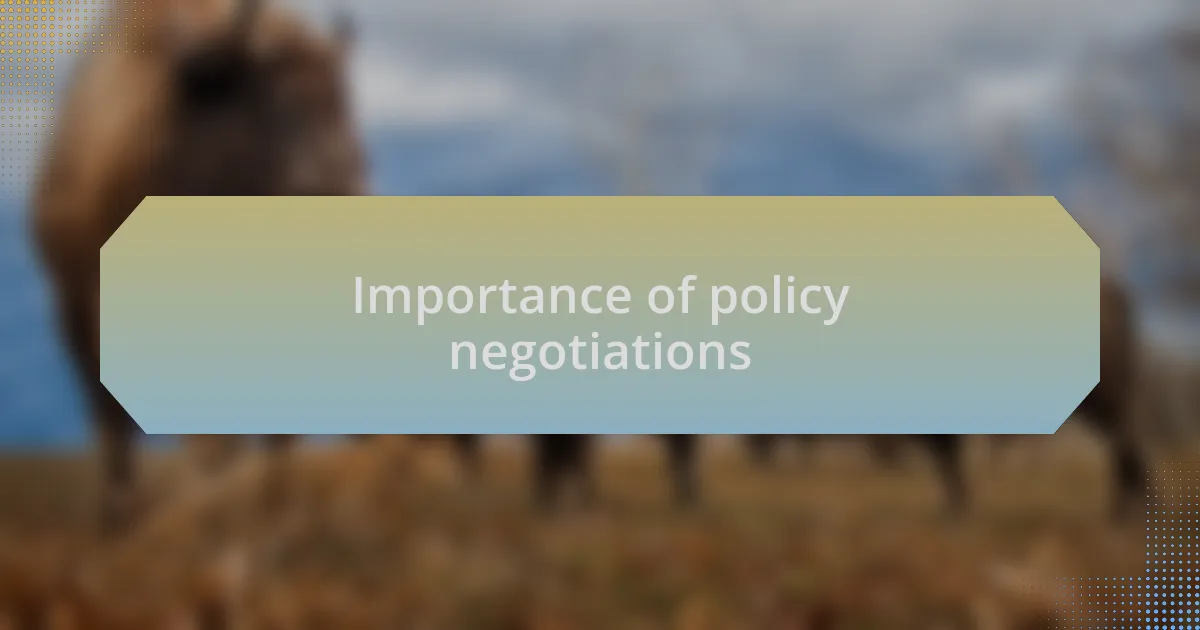
Importance of policy negotiations
Engaging in policy negotiations is essential because they serve as a bridge connecting diverse stakeholders with varying interests. I remember participating in a negotiation roundtable where local communities, conservationists, and government officials came together. It was eye-opening to see how each party’s perspective contributed to a more comprehensive understanding of what wildlife conservation really entails.
The efficacy of these negotiations often hinges on understanding the underlying motivations of each party. In one instance, I witnessed a discussion where economic interests clashed with environmental priorities. By fostering open dialogue, we ultimately reached a compromise that considered both conservation goals and economic incentives—highlighting that productive negotiations can lead to innovative solutions.
Moreover, policy negotiations not only create frameworks for protection but also enable adaptive management strategies. I’ve seen firsthand how successful negotiation outcomes can be revisited and refined over time. Isn’t it comforting to know that when partnerships get established through respectful negotiations, the promise of ongoing collaboration can lead to sustained impacts for wildlife conservation?
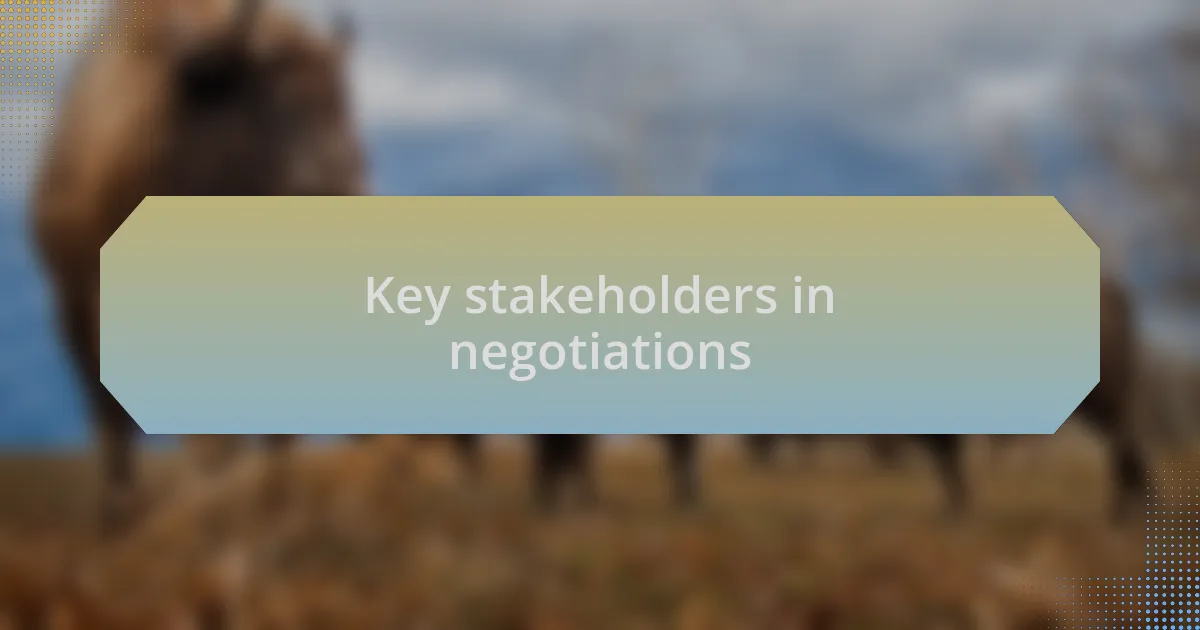
Key stakeholders in negotiations
When discussing key stakeholders in policy negotiations, it’s crucial to recognize the role of local communities. In my experience, community members often possess intimate knowledge of wildlife habits and ecosystem dynamics. Their insights can be pivotal in negotiations, as they help ensure that policies resonate with on-the-ground realities.
Government officials also play a vital role in negotiations. I recall an instance where a government representative expressed the challenge of balancing political pressures with conservation needs. It was a delicate dance, but their participation underscored the importance of transparency and accountability in forming effective policies. Without their involvement, negotiations risk falling flat, lacking the necessary authority to implement and enforce decisions.
Lastly, NGOs and conservation groups are essential players in this arena. From my observations, their expertise can guide discussions toward science-based approaches. I vividly remember a negotiation where an NGO shared compelling data that shifted the entire dialogue. It made me wonder—how often do we miss out on valuable insights when we forget to include these passionate advocates in the conversation? Each stakeholder brings a unique voice, enhancing the richness of the negotiation process.
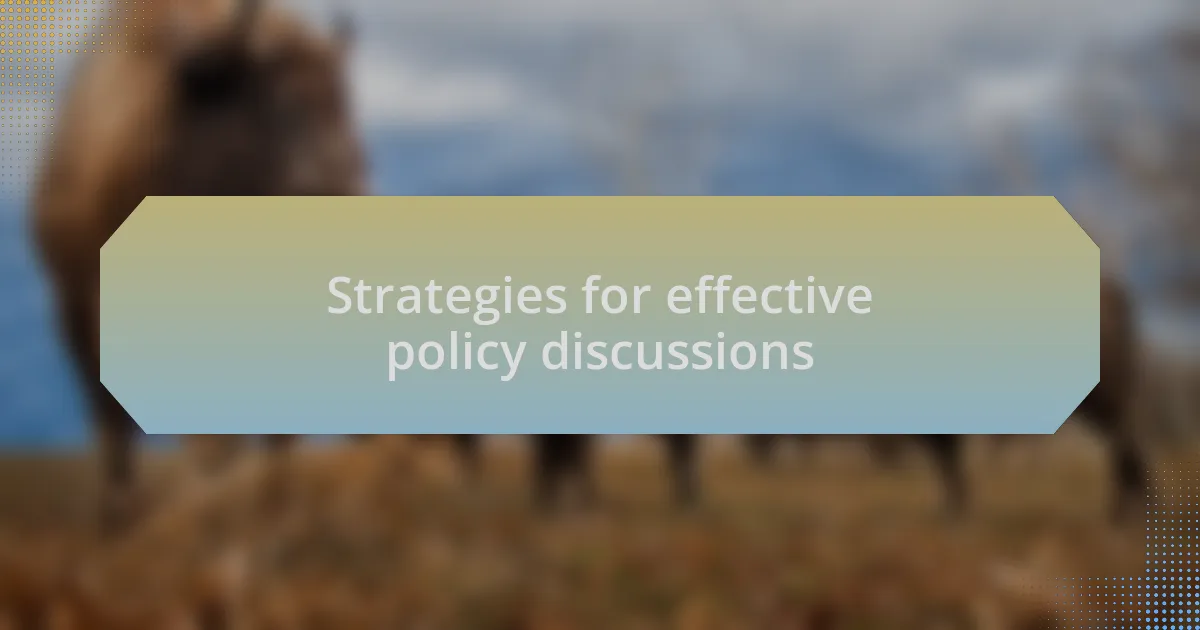
Strategies for effective policy discussions
When engaging in policy discussions, it’s essential to create an inclusive atmosphere where every stakeholder feels heard. I remember one particular negotiation where we began with a roundtable format, allowing each participant to share their views without interruption. That initial openness set a collaborative tone, making it easier to navigate subsequent disagreements. Have you ever noticed how a simple shift in format can foster deeper understanding?
Also, I’ve found that presenting well-researched data can significantly bolster your arguments. For example, during a negotiation on land use, I shared statistics on habitat loss that left an impact on the attendees. It was surprising to see how numbers could evoke a sense of urgency, bringing participants back to the core issue of wildlife preservation. How often do we underestimate the power of solid evidence in shaping opinions?
Finally, focusing on shared goals instead of differences can turn potential conflicts into opportunities for collaboration. In one negotiation, I proposed framing our discussions around a common vision for the future of local wildlife. This simple strategy not only diffused tensions but also sparked innovative ideas that I had never considered. Isn’t it fascinating how emphasizing what unites us rather than divides us can lead to more productive dialogue?
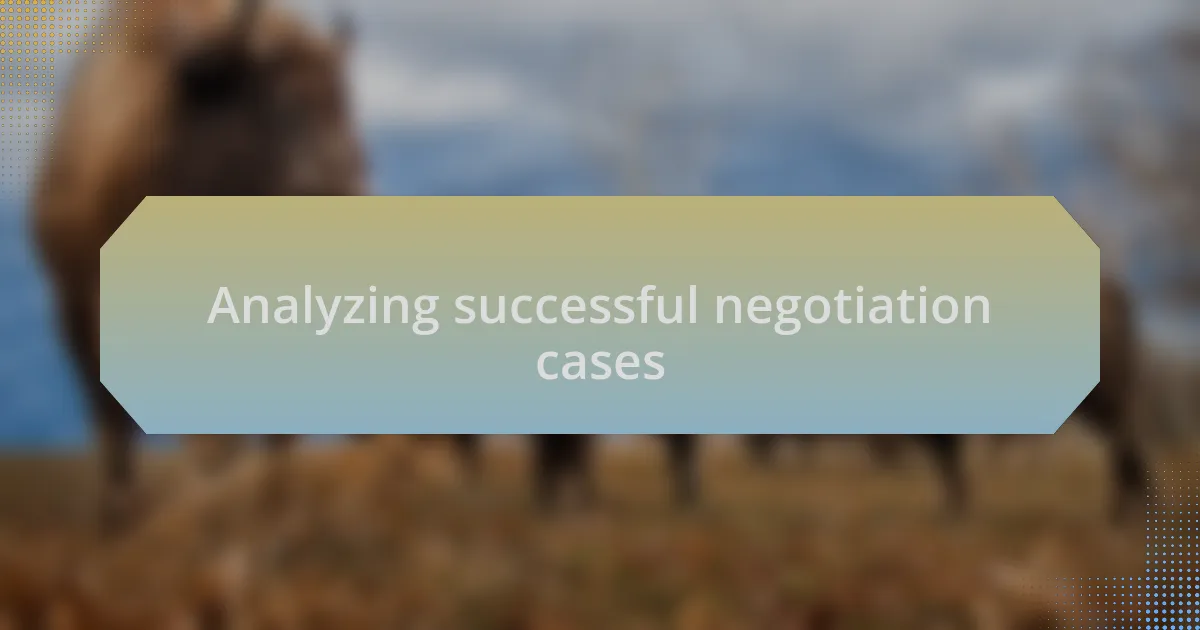
Analyzing successful negotiation cases
Successfully analyzing negotiation cases in wildlife conservation provides valuable insights into effective strategies. I recall a specific case where a coalition of NGOs successfully negotiated with a government to implement stricter anti-poaching laws. By showcasing stories of local communities affected by poaching on both an emotional and economic level, the negotiators established a shared urgency that appealed to the policymakers’ sense of responsibility. Have you seen how personal stories can turn abstract issues into relatable concerns?
In another instance, I witnessed a collaboration between conservationists and local farmers over land-use issues. They began by acknowledging the farmers’ needs for sustainable income while emphasizing the ecological benefits of coexistence. This understanding opened doors for innovative solutions, like conservation easements, where farmers agreed to preserve certain areas in exchange for financial incentives. Isn’t it incredible how empathy and understanding can lead to win-win situations?
Finally, I was part of a negotiation where the focus was on creating a wildlife corridor that benefited both conservation efforts and local communities. By involving local leaders right from the start and integrating their input into the project, we cultivated trust and a sense of ownership. The final agreement not only protected vital habitats but also enhanced community livelihoods through eco-tourism initiatives. Have you ever seen how fostering collaboration can transform opposition into partnership?
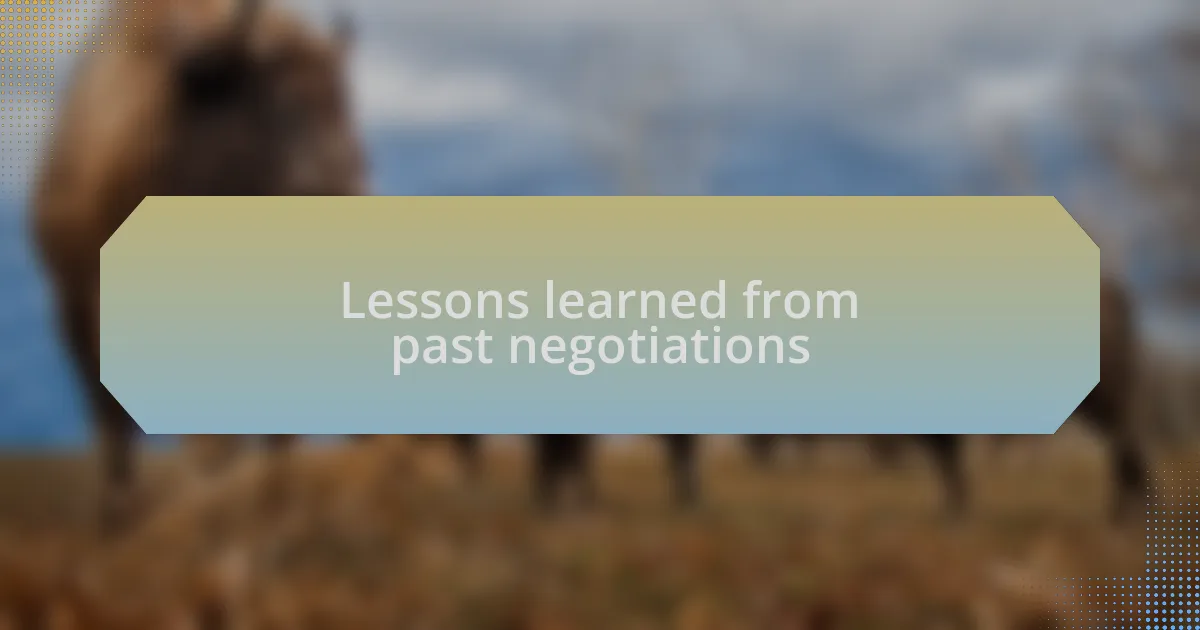
Lessons learned from past negotiations
One key lesson from past negotiations is the importance of building trust among stakeholders. I remember attending a summit where different parties were at odds over resource allocation. It was through honest dialogue—where each group expressed their fears and priorities—that we began to see eye to eye. This experience taught me that fostering relationships, rather than merely pushing agendas, can create a foundation for true collaboration.
Another vital takeaway is the power of flexibility in negotiations. There was a situation where I was part of a team advocating for establishing marine protected areas. Initially, there was strong resistance from fishing communities. However, we adapted our approach by suggesting initial trial zones where fishing would be limited, allowing stakeholders to experience the benefits firsthand. It was fascinating to witness the gradual shift in perspective; isn’t it powerful how compromise can lead to unexpected support?
Additionally, effective communication strategies emerged as a common thread in successful negotiations. I recall a workshop where we role-played various negotiation scenarios. By tailoring our messaging to resonate with specific audiences—using language that demonstrated both environmental and economic benefits—we became more persuasive. Have you ever noticed how the right words can not only inform but also inspire action among diverse groups?
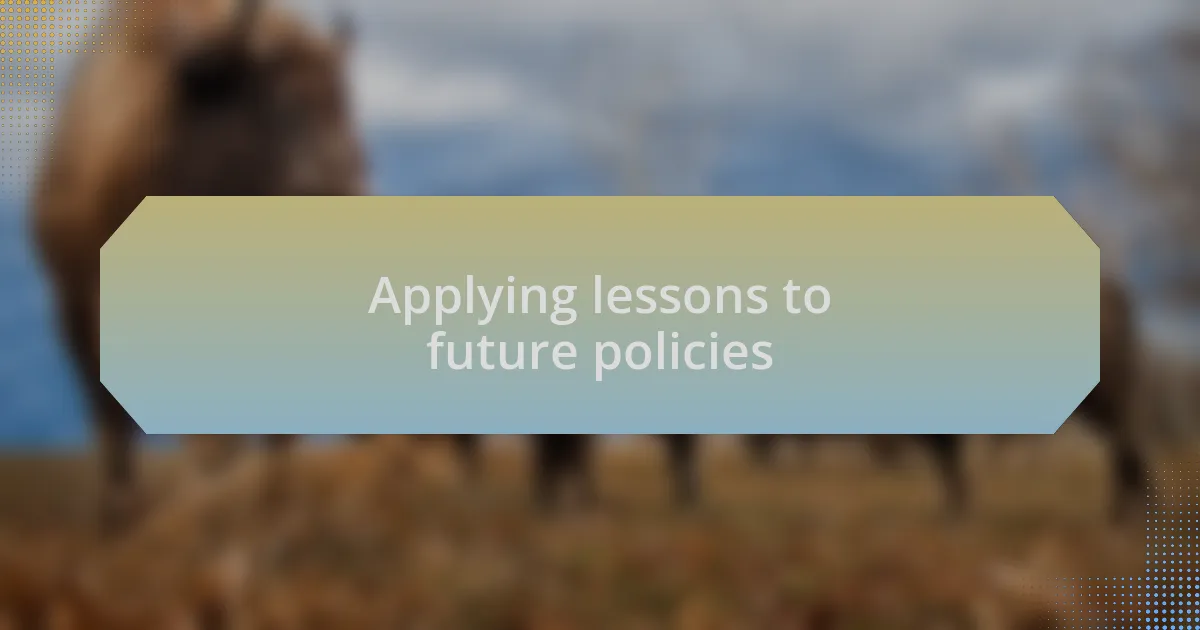
Applying lessons to future policies
Applying lessons from past negotiations is crucial for shaping future policies in wildlife conservation. I once worked with a coalition that learned the hard way that timelines must be realistic. We aimed to secure agreement on a wildlife corridor within a tight deadline. Our impatience led to rushed discussions that ultimately sidelined important concerns from local communities. This experience highlighted the necessity of incorporating adequate time for feedback, ensuring every voice is heard. Have you ever thought about how patience can transform a dialogue into a more equitable process?
Understanding the dynamics of power is another lesson that stood out during negotiations. During a recent policy review meeting, I witnessed a lesser-represented group finally given the opportunity to speak. Their stories brought to light the profound impact of conservation measures on their daily lives. It struck me how power imbalances can muddy discussions. Recognizing and addressing these dynamics can pave the way for more inclusive policies. After all, shouldn’t every stakeholder’s voice count equally?
Incorporating monitoring and evaluation into future policies is essential. I participated in a project that established benchmarks for assessing the success of newly implemented wildlife protection measures. We found that setting clear targets kept us accountable and allowed us to make necessary adjustments along the way. It’s a practical approach that fosters resilience in policy, but how often do we see policies crafted without a clear follow-up plan? Crafting future policies with an eye on evaluation not only supports continuous improvement but also builds trust with stakeholders, ensuring their investment in the process.